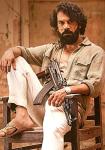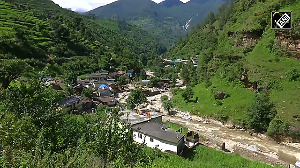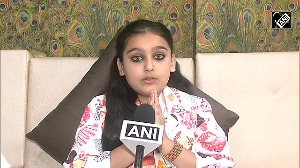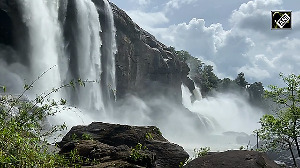Sreenath Sreenivasan will take over as the Chief Digital Officer, New York City this week.
'It has reaffirmed my faith in humanity, especially when I have come to India and the general feeling is that Twitter is bad, the Internet is bad.'
'That's what I keep hearing from people, about the trolls and all the problems,' Sree tells Rediff.com's Monali Sarkar.
'I always used to say ignore the trolls and move on and focus on your fans and friends. That was easy for me to say.'
'But now when I say it, I really mean it.'
 /p>
/p>
Sreenath 'Sree' Sreenivasan has been making headlines for a while now. An early mover in social media, he was the first chief digital officer at Columbia University.
He then became the first CDO of New York City's iconic Metropolitan Museum of Art where, among other things, he led its Web site's redesign, bringing more of the museum online. He also led the development of the museum's first app and innovative initiatives like #emptyMet where he invited influential people into the museum during closed hours.
He even made news when the Met Museum announced in June that he would be leaving 'in the context of the re-centering of the Museum's work and current financial restructuring' (read cost cutting).
While many would have turned inward and attempted to hide or sugarcoat the departure, Sree took a difficult but more open way. The accomplished social media guru turned a layoff into an inspiring digital campaign and a life lesson.
He opened up to his thousands of followers and social media friends -- 79,600 followers on Twitter and more than 221,200 followers on Facebook (not counting the 5,000 friends) -- about what had happened and asked for suggestions and help.
The response, he told Rediff.com's Monali Sarkar, was "overwhelming."
Not only did he receive a lot of media attention for this bold social media experiment, so many people took the time to fill out a form he had created for friends to offer advice that he had to create a second form to accommodate "the giant digital hug."
Sree hasn't had the time to even read all the advice, let alone try it out.
He was immediately snapped up for social media tours -- taking him to France, the West Asia and India. And then came the big news.
New York Mayor Bill de Blasio announced on August 1 that Sree had been appointed the CDO of New York City.
'To move our city's digital ecosystem into the 21st century, we need to ensure our city's resources are at the fingertips of every New Yorker. With Sree Sreenivasan's wealth of experience, I am confident that he will work to promote transparency, access and progressive values with our digital tools, helping spread access across the five boroughs,' the mayor said in a statement.
Sree says he views his role as more of a "chief listening officer", and that he wanted to draw on not just what he had learned working in "four critical NYC industries: Education, media, arts and culture, and nonprofits," but listen to ideas from all over the world.
Over to Sree 3.0.
You have spoken extensively about losing your job at the Met and your response to it, but can you still briefly take us through that time -- from receiving the news to how you came to the decision to talk about it openly?
It's not the Indian way; it's not even my way. Lot of people think that I post a lot on social (networks) so I must post everything, but I don't. This is not something I would have wanted to talk about in any way and I was very, very, nervous about it. I hadn't planned on talking about it at all.
I then realised that, for the first time, I was experiencing what I had watched dozens and dozens of people -- maybe hundreds of people -- I know over 20 years who have gone through downsising, layoffs...
I thought that since I am always saying to people that you can ask for help, let me ask for help -- and ask for it publicly -- and see what happens.
That's why I did it, with great reluctance.
The last people I spoke with before I publicly spoke of it were my parents and my kids. My kids because they would be like there won't be Christmas this year. My parents because government folks (Sree's father T P Sreenivasan is a former Indian ambassador and Rediff.com columnist) are not used to a situation like this.
Hiring and firing is not part of their lives, and certainly no one expects their 45-year-old son to be unemployed.
But there was an incredible response (when I opened up about it on social media), and I am glad I did it that way.
In the end, I got this job because somebody heard the news and reached out to me.
You made a huge -- and successful case -- for being open about your vulnerability on social media. But at a time when social media, Twitter especially, is full of trolls and people willing to kick someone when they are down, is it something that everyone can handle?
No, they can't. But I have got to say that the response I got was overwhelming. I can't even think of somebody who was negative in their response to me, to what happened. That was really nice.
I always used to say ignore the trolls and move on and focus on your fans and friends. That was easy for me to say. But when I went out like this, there was a good chance that this whole thing would have been the other way round. So, now when I say it, I really mean it.
What gave you the strength to be so open about this, to turn adversity into opportunity?
Partly it was that I didn't have much of a choice. This was going to be public.
The other way to this would have been to say it was my choice; I wanted to leave. But I would have had no way to face my kids (his twins Durga and Krishna).
What would I tell them? That I left a job I loved at Columbia; I really enjoyed every minute of it. That I left a job that gave them free tuition (at Columbia), free part-tuition anywhere in the world; one of my friends said I left a million dollars over the next eight years on the table when I walked away.
So, I didn't do it for the money, but I gave up their free tuition for the job (at the Met), and now I am leaving that job. If I said that I was taking time off, it wouldn't make any sense to them. I couldn't lie to the kids. I wouldn't have been able to face it.
As it is, I had taken a big risk by walking away from Columbia, so the combination gave me no choice.
You had offers from many parts of the world, but what made you so determined to stay in New York? Was it only your children's education or more?
I had decided that I had to definitely do right by the kids. With my having taken this big risk, the last time I couldn't afford to not do right by them in whatever choice I made.
I was really open to looking at jobs outside... but the fact that this came up in New York was a blessing and the right opportunity as the next step in my career.
In the brief time between the Met and the new job you have received 1,000+ suggestions on what you could do next. You probably haven't had the time to even look at them, forget trying any of them...
My plan was to spend the summer reading all this, analysing them and having fun with them.
That's what I keep saying that it so amazing how nice everybody is, that about 1,500 people would take the time -- I had to make a second form -- to fill out the form. It just shows how nice people are.
It has reaffirmed my faith in humanity, especially when I have come to India and the general feeling is that Twitter is bad, the Internet is bad. That's what I keep hearing from people, about the trolls and all the problems.
That's not to diminish those problems -- because that's definitely there -- but it also shows you that in the right circumstances, there can be positive things on the Internet.
Now that the appointment has happened, can you tell us how it came about?
Somebody in City Hall saw that I was leaving and, because there was going to be an opening, they contacted me. I was delighted to reply to them.
My plan was not to take a full-time job immediately, but to do a combination of speaking, consulting work and work on a book. But then this happened.
You acknowledged that CDOs Rachel Haot and Jessica Singleton have made New York City very digital. How do you plan to take it forward? How do you define the job of NYC's CDO?
I had a lot of ideas, but the mayor has changed any way that I could think about it because he tweeted my job; exactly what I have to do: To make New York City 'the most tech-friendly, transparent, digitally equitable city in the world.'
That's an amazing thing. That's my job description. How many people on the planet have their job descriptions published like that? I can't think of very many people.
For example, in your life what your editor tells you... I wouldn't know that sitting outside. But here, it's almost like a perfect part of this story that he didn't just say welcome, let's make New York great. He said here are your three things to do, specifically.
That's what you want as an employee. You want clear instructions. You just don't expect it to be super clear and super public like this (says this with a smile in his voice), but that is part of the fun.
Digital.NYC was formed to help NYC compete with Silicon Valley as a home for startups, think-tanks, and incubators. It is interesting that the CDOs so far, including you, were students of humanities. In fact, Haot was a student of history like you.
How do you view the role of humanities in expanding the scope of this job?
Every chief digital officer needs a CTO (chief technology officer) who is a great partner. That's what I had at Columbia. That's what I had at the Met.
You need the technology infrastructure to make the city work. On my side I will be working on how to expand what we are doing.
A CDO's job is very different from a CTO's, a CIO's (chief information officer) and others. Our job is to help translate and facilitate what happens with the technology work. You don't have to be a technologist yourself you have to be somebody who understands it.
I like to say I'm not an engineer, but I've played one on TV (he has had multiple stints on television as a tech guru). I have always found that part of the reason I have a journalistic career is because I have been able to explain technology to other people. That's a key part of this kind of work.
You need diplomatic, political and persuasive skills in order to do this kind of job. That's what this role is.
Are you even a little anxious?
Definitely anxious because I have so much to learn. If I was very comfortable, this wouldn't be a challenge, and I wouldn't have taken it up.
It's the chance to do the kind of things we have been talking about that need to happen in a city like New York. It's been very interesting to think about how I'll do this.
I have to learn municipal governance. I have to learn how New York City works. I have to learn about my colleagues, learn about all the departments, and learn about what's already been done with the digital playbook.
The great news is there's a very strong technology team already there in place under Deputy Mayor Alicia Glen and Mayor de Blasio. So, my role is to expand all those things that they have already done.
I have to study those things and learn. I have to figure out bureaucracy. So, it's going to be a challenge. It will not be easy and I wasn't looking for something easy anyway.
Mayor de Blasio goes into a re-election in almost exactly 13 months from the day you join. How does that play into the work you plan to do?
My job is not political. I am not on his political staff. As with anything like this -- in a government job -- there are limits to the amount of time you have to do things. I think it is going to be an interesting challenge but also an opportunity.
It focuses your mind when you have only a few years to do something as opposed to a limitless runway.
One of the things that really attracted me to the job was Mayor de Blasio's commitment to digital equality. It's something that I have been talking about and have done lots and lots of programmes on -- the amount of digital divide in just Manhattan.
Some of the richest people and the poorest people in America all living near each other, and how do we get them to interact?
How do we the get the opportunities that are available to the rich to the poor, too? Part of that has to do with digital access and information and data...
So, when I look at the three parts of the job, the first two are something that we can work on and we should work on, but the third one we have to work on.
One of the problems that San Francisco has is the amount of inequity. When you walk around just in the neighborhoods where the world's most famous companies are, the amount of homeless and resentment and despair is shocking.
We want to avoid anything that exacerbates the inequality.
You have lived with change for a large part of your life. Your dad said you went to 10 schools in 12 years! But then you also stayed rooted in Columbia for 20 years. How do you view change now?
I was going to be there (at Columbia) till I was 90; Columbia doesn't have a retirement age. My plan was not to retire at all, and that's why the Columbia job was so perfect.
This (the Met) is only the second full-time, long-term job I have had. It's going to be interesting to see how I deal with change. I think I am certainly more open to it now.
I think you were with me when I came to your office and said I am leaving Columbia... Part of the reason I left was because I wanted to try something new, take a big challenge on.
The thing I remember most clearly about that day was you said you had a 30-year love affair with the Met...
That's true. I, by the way, found the teacher who gave me that love affair with the Met. Dorothy Donovan is a retired school teacher, but she is a Met member and has donated money from her retirement to the Met.
I found her on Facebook. That's an example of what Facebook did for me. I was able to track her down. It's pretty amazing.
When you left Met, you had mentioned that you might write a book. Can we still look forward to that book from you?
I won't have time now. If I were just doing consulting and writing work, I would certainly have (the time). But now we'll see where that goes.
Part of the thing was I was not keen on writing a book because the stuff I have to say goes out everyday. That's why I like writing tweets and posts.
Instead of having one book in the Library of Congress, I am excited to have 10 a day in the Library of Congress.
Why several people convinced me about this book is there are some timeless things in what I have gone through and what I have observed.
It's really not about me; it's about observing people and situations for two decades. You get certain ideas. That's what this was about.

What's a typical Sree day like?
Before I had kids, I used to sleep at 2 or 3 in the morning and wake up at 8 or 9 in the morning, whenever I had class I'd wake up. That kind of thing.
Once the kids arrived, I would wake up at 6 am to do an hour of work before they woke up. That was my lifestyle for a very long time.
And then this December we got a dog -- a dog that I didn't want for 16 years. I fought (wife) Roopa (Unnikrishnan, Commonwealth Games gold medalist, Arjuna Award winner, Rhodes Scholar, management consultant); she'd been begging for a dog. The kids were begging for eight years. And I just said no...
But that's part of the change I made. I went and got a dog.
Now, I wake up at 5.15 am at least so that I can do one hour of work before I walk the dog, and then I end the day also with the dog walk.
In the six weeks where I had this situation -- they told me at the end of May -- I was talking every phone call, every interview opportunity, every meeting, every coffee. I don't even like coffee! I was going on walks.
Obviously, 90 per cent of it was for me, but in a few cases it was people who wanted help and wanted guidance, and I would invite them.
I will never forget the day I'd told this guy that the only slot I have available is a 6.15 am walk and he showed up. And only after he came did he tell me that he had to wake up at 4.30 am in order to come see me at 6.15. I was so touched. It was so amazing.
And I have had phone calls ending at 10.30 pm, 11.30 pm, sometimes at 12.30 am. When you feel like you are in a desperate situation, you will do whatever it takes.
I tried to do stuff I would have never ever done. Like the day I walked into a public fountain, which I would never have done. I took my shoes off and just went in.
I walked over the Brooklyn Bridge by myself just to have that experience.
That's what I'd hoped to do the rest of the next year or so, and then this opportunity came by and I happily put all that on hold.
Tell us something we don't know about Sree 3.0.
When you think that you have a lot of time on your hands is when you start to worry about how will things happen.
Before my goal was to walk five miles every day, and after this happened I said, I have more time, so I have to increase that to 10 miles a day. There was one week in particular where I walked (checks the records on his phone) 50 miles. That was the week of June 19. That's the week I was desperately doing all these interviews.
What I was doing was I had converted all the meetings that I could, all the phone calls into walking phone calls.
My friend Andrew got me these headphones, called Motorola Buds, that are meant for walking... They are really good because they are still headphones, but more importantly they have two microphones.
If you have ever been on the receiving end of a phone call when someone is driving or walking, it's really irritating; you can't hear them. But this has two microphones. This was a tool that I used. Otherwise, there was no way that I could walk 50 miles and do all the interviews.
Those are things that probably people don't know about me.
What is your first memory of NYC?
The first memory is landing in 1980 and coming from JFK (John F Kennedy airport) into the city and seeing really tall buildings. I will never forget that feeling. Sometimes I still have the feeling when I come in.
And there was the time we went to the World Trade Center, maybe a month after we got there. Being on top of the world like that and within 20 years those two buildings were gone.
I have another memory that is funny.
Almost in the first week of school the teacher in our reading class said, 'Anyone here has read Encyclopedia Brown? (a series on the adventures of a boy detective Leroy Brown.)' And I was very enthusiastic and I raised my hand and stood up and said, 'No, but I have read Collier's Encyclopedia.'

Growing up, you lived in more cities than most people visit in a lifetime. Why did you make New York your home?
New York is a welcoming open place, and I was their in my formative years.
Maybe because (in) Columbia there (was a global) media (industry that) exposed (me) to the world; I had told my parents when I was 12 that I was going to be a journalist.
Of course, no Indian parent wants their kid to be a journalist. I don't think that's ever going to change even in the era of superstar anchors and all of that.
But those are the kind of reasons why I stayed in New York.
If someone had to see New York in a day where all would you ask them to go?
I would insist that they wear good walking shoes and then think about how much energy they have and what they are willing to see and what their interests are.
I would save a trip to the Empire State Building for the end of the day. It is open till 2 am, so if you have a day you can end it at 2 am there. That gives you the whole day from 7 am. That's a much longer day than you would have in most cities.
Depending on the season, I'd walk through Central Park.
I'd stop at the Met, spend two or three hours. Pick a few things; you can't see the whole thing and you have to accept that. I'd go to one other museum, whether it is the Museum of Modern Art or the Whitney Museum.
Then I'd walk down 5th Avenue. I'd go to the Flagship Apple store; that's also open 24 hours.
If you are Indian and coming to New York, I'd walk by the Pierre Hotel and Plaza, two of the biggest and most famous hotels, which have the Indian flags flying outside them. That's exciting.
I would go to the Highline and walk along it because there is so much to see.
I'd definitely go to Brownsville and walk around the memorial (dedicated to local World War I heroes).
And if you have the fortitude, I would go down and go into the 9/11 museum.
I would make sure that I ate interesting food throughout the day.
And I would also go across the Brooklyn Bridge if you have time; probably a 30-minute walk.
There are so many options of things to do: You could walk around Brooklyn. You could walk around Queens. You could also walk up from the Met and go into Harlem. You could go see a Broadway show or go off-off-off Broadway if you can't afford Broadway...
But New York cannot be experienced in a day and New York cannot be experienced in a lifetime. And that's what so exciting. I keep saying New York is the greatest city in the world.
What are your favorite spots in the city?
I love walking along Riverside Drive, in Riverside Park, which is not a popular tourist place. I love Central Park.
There is this spot in the Met where you can stand and you can see some of the world's most famous artists in one place.
You can see Van Gogh and Gaugin and Picasso all in one room, which I love.
I used to like walking through Times Square a lot more when it wasn't as crowded, but I still like going through it. The energy you feel in Times Square is really excellent.
The Cathedral of St John the Divine, the world's largest Gothic cathedral.
I like being on Kalpana Chawla Way in Jackson Heights. To think that a street in New York is named after an astronaut is not surprising, but to think that the astronaut was an Indian woman (is).
It's a neighborhood full of desis and it's very exciting.
What are your five favorite NYC eateries?
Eataly, for sure. I have lots of small places that I like to go and eat, but one of the places I found next to Eataly is this place called Indi Kich, which is like Chipotle for Indian food.
I also like to try different types of cuisines. I love Thai, Chinese, Japanese.
One of the hidden joints in New York is this place called The Symposium near Columbia. I really love it.
For a while there you had an interesting where-am-I-in-New-York game on Facebook. Will we now see a resurrection of that?
I don't know. Starting October, I will be this civil servant so I have to be very careful about what I say, what I do.
I want to figure out what are the things that will interest people. But mostly I think of my job as CDO as chief listening officer -- listen to people for ideas, highlight interesting things that people are doing, not just in New York, but around the world.











